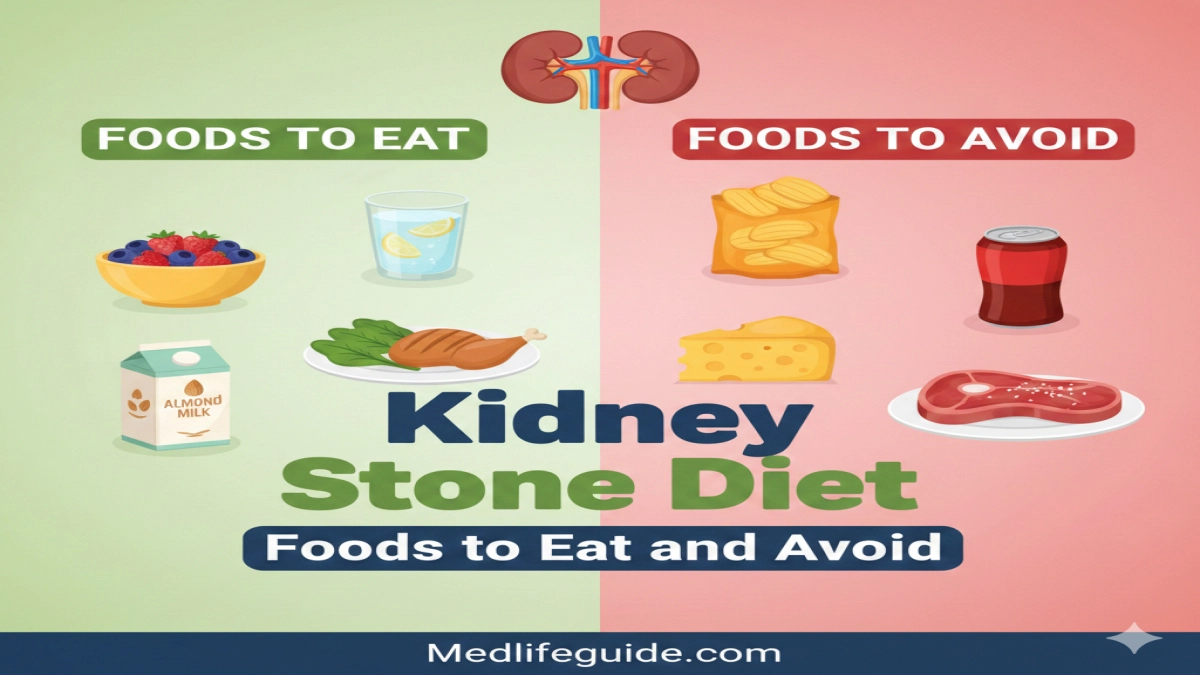Prevent kidney stones with smart eating. Stay hydrated, eat citrus, and limit salt. These changes can prevent painful blockages.
Kidney stones form when substances in urine concentrate and solidify. Calcium can combine with oxalate or phosphorus. Uric acid, from protein breakdown, can also form stones.
Passing these stones is very painful. However
Prevent kidney stones with smart eating. Stay hydrated, eat citrus, and limit salt. These changes can prevent painful blockages.
Kidney stones form when substances in urine concentrate and solidify. Calcium can combine with oxalate or phosphorus. Uric acid, from protein breakdown, can also form stones.
Passing these stones is very painful. However, most stones can be avoided with good nutrition. Simple dietary changes can save you from future pain.
What to eat and drink
Example: Your food choices can push your kidneys toward balance or trouble. Small shifts every day make a real difference.
If you’re trying to avoid kidney stones, what you eat and drink is as important as what you shouldn’t eat and drink. Here are some important rules of thumb to keep in mind.
Stay hydrated
Example: Picture your kidneys working like filters. Water keeps everything moving so crystals can’t form.
Fluids, especially water, help to dilute the chemicals that form stones. Try to drink at least 12 glasses of water a day.
Up your citrus intake
Example: A squeeze of lemon or a glass of orange juice adds natural citrate that helps block stones.
Citrus fruit, and their juice, can help reduce or block the formation of stones due to naturally occurring citrate. Good sources of citrus include lemons, oranges, and grapefruit.
Eat lots of calcium (and vitamin D)
Example: Calcium from food pairs with oxalate in the gut so it never reaches your kidneys. Vitamin D helps your body use that calcium well.
Get calcium from food, not supplements, to control oxalate levels. Good sources include milk, yogurt, and cheese. Vegetarians can opt for legumes, tofu, dark greens, seeds, and molasses. Alternatives to cow’s milk are lactose-free, fortified soy, or goat’s milk. Combine calcium foods with vitamin D for better absorption. Find vitamin D in fortified products, fatty fish, mushrooms, and cheese. A diet rich in these nutrients helps prevent kidney stones and boosts health.
Food and drinks to avoid on a kidney stone diet
Example: Knowing what to skip helps your kidneys stay calm. A few limits now can prevent future pain.
Limit salt
Example: Too much salt pulls calcium into your urine. Less salt means fewer stones.
High sodium levels in the body, can promote calcium buildup in urine. Avoid adding salt to food, and check the labels on processed foods to see how much sodium they contain. Fast food can be high in sodium, but so can regular restaurant food. When you’re able, ask that no salt be added to whatever you order on a menu. Also, take note of what you drink. Some vegetable juices are high in sodium.
Lower your animal protein intake
Example: Heavy meat intake raises uric acid and lowers protective citrate. Plant proteins offer safer options.
Foods like red meat, pork, and poultry increase uric acid. They are high in protein, which also lowers urinary citrate, vital for preventing stones. Yet, protein is crucial for health. Quinoa, tofu, hummus, chia seeds, and Greek yogurt are good, non-animal options. Talk to your doctor to find the right protein level for you, balancing health needs and kidney stone risk.
Be mindful of oxalates
Example: Some foods carry lots of oxalate. Pairing them with calcium helps block stone formation before it starts.
Being smart about eating oxalate-rich foods can prevent kidney stones. People with a history of stones should avoid high-oxalate foods. If you’re at risk, talk to your doctor about diet. When eating oxalate-rich foods, add calcium. This combination reduces the risk of stones. Calcium binds with oxalate before it reaches the kidneys, preventing problems. Always get medical advice for kidney health. High-oxalate foods include:
- chocolate
- beets
- nuts
- tea
- rhubarb
- spinach
- swiss chard
- sweet potatoes
Don’t drink colas
Example: Cola contains phosphate, which encourages stones. Skipping cola can protect your kidneys.
Avoid cola drinks. Cola is high in phosphate, another chemical which can promote the formation of kidney stones.
Reduce or eliminate added sugar intake
Example: Added sugars sneak into your diet and can raise stone risk. A quick label check helps you stay safe.
Beware the hidden dangers of added sugars lurking in processed foods and beverages. These sweeteners, from corn syrup to agave nectar, may boost your kidney stone risk. Scan labels for sucrose, fructose, honey, and cane sugar. Watch your intake of sweets, fruits, sodas, and juices. Stay vigilant – added sugars hide under many guises in our modern diet.
Tips for a kidney stone diet
Example: If you’ve had stones once, you’re more likely to get them again. Staying consistent is your best protection.
Past kidney stones raise recurrence odds. Prevention requires vigilance: take prescribed meds and monitor diet. Your doctor will diagnose stone type through tests, then tailor a diet plan. The DASH Diet may be recommended. Active prevention is key to avoiding future stones.
- drink at least twelve glasses of water daily
- eat citrus fruits, such as orange
- eat a calcium-rich food at each meal, at least three times a day
- limit your intake of animal protein
- eat less salt, added sugar, and products containing high fructose corn syrup
- avoid foods and drinks high in oxalates and phosphates
- avoid eating or drinking anything which dehydrates you, such as alcohol.
Takeaway
Example: Most stones can be avoided. A few consistent habits protect you from serious pain.
Kidney stones are typically a painful condition. Fortunately, diet can be an effective tool in managing and preventing kidney stones. Staying hydrated and avoiding certain foods that are high in salt and sugar, and pairing calcium with oxalate rich foods are important elements of a kidney stone diet.
Medlifeguide give information about also kidney diseases, chronic kidney disease (CKD) and also diet plans for kidney health; reach out to acheive these information for your and your family’s health
Medical Disclaimer
All content published on medlifeguide is intended for informational and educational purposes only and does not substitute professional medical advice, diagnosis, or treatment. Always consult a qualified healthcare provider regarding any medical condition, symptoms, or treatment decisions.

